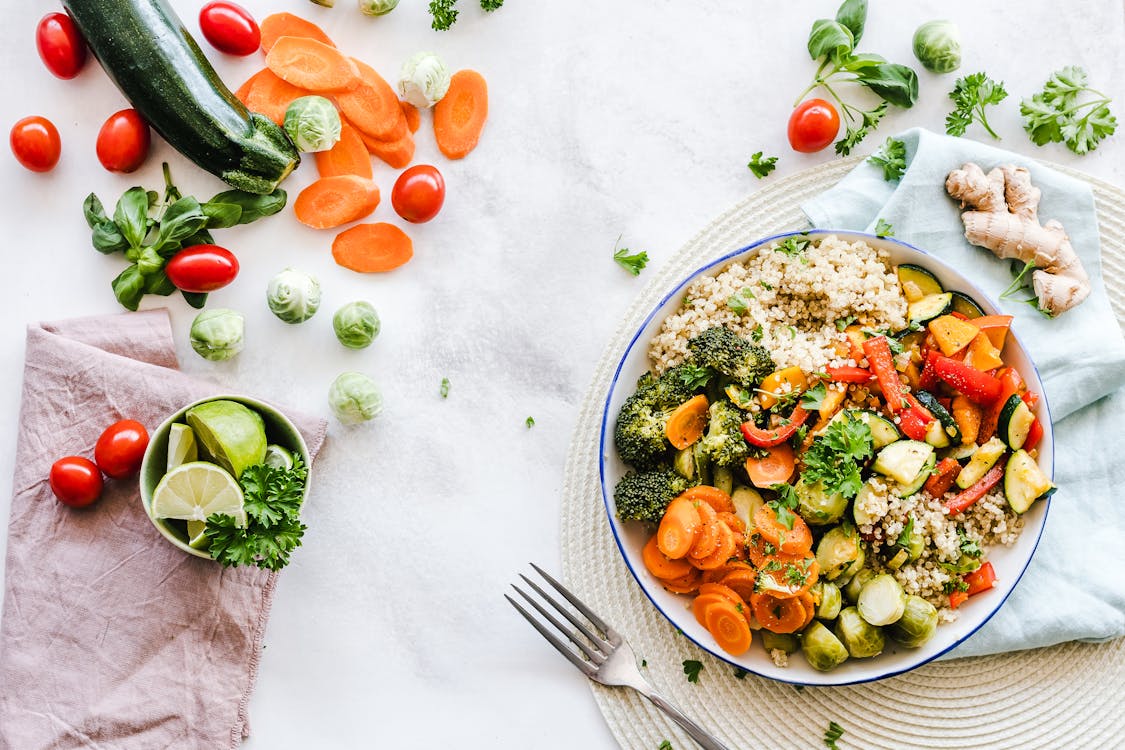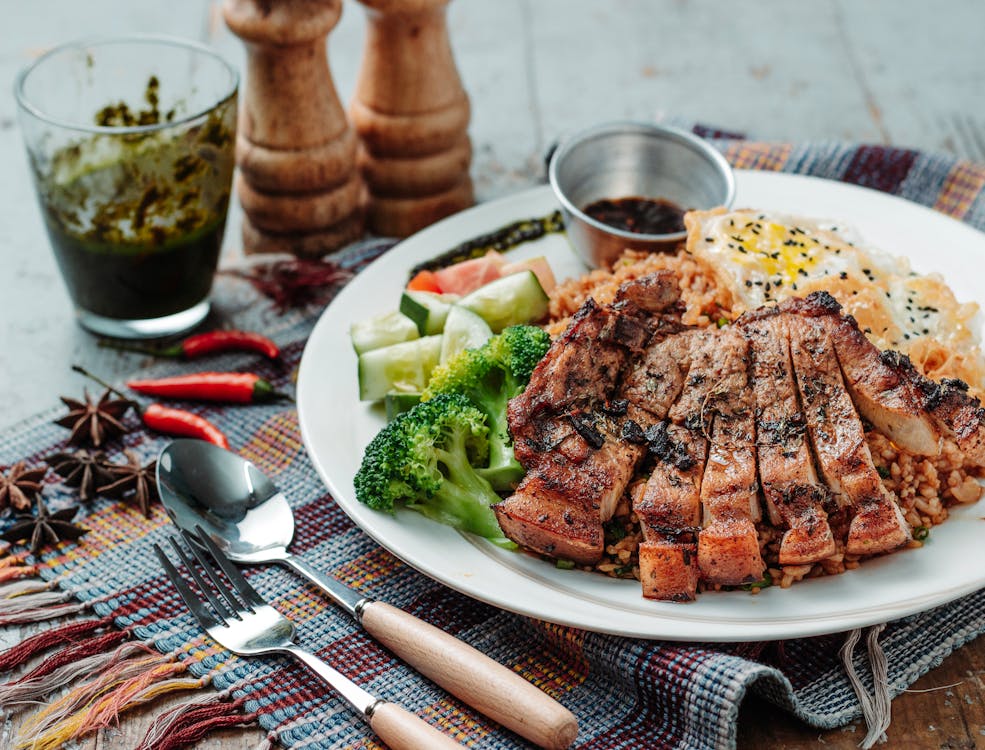Table of Contents
- The Intricate Dance: How Food Influences Sleep Mechanisms
- Fueling Slumber: Nutrients That Promote Better Sleep
- Designing Your Sleep-Friendly Diet: Foods to Embrace
- The Sleep Saboteurs: Foods and Drinks to Limit or Avoid Before Bed
- Timing is Everything: When You Eat Matters Too
- Practical Tips & Actionable Insights for Better Sleep Through Diet
- Conclusion: Nourishing Your Way to Restful Nights
Eat Your Way to Better Sleep: Understanding the Powerful Impact of Food on Your Nightly Rest
Ever find yourself tossing and turning, staring at the ceiling, counting endless sheep that just won’t cooperate? You’ve tried darkening the room, ditching screens before bed, maybe even invested in a white noise machine. But have you considered what’s on your plate? It turns out the old adage “you are what you eat” extends far into the night. The connection between food and sleep is profound, influencing everything from how quickly you fall asleep to the quality of your slumber throughout the night.
Many of us focus on external factors for sleep hygiene, often overlooking the significant role our diet plays. Certain foods can act like natural sleep aids, while others can be saboteurs, leaving you wired, uncomfortable, or waking up frequently. Understanding this intricate relationship is the first step towards unlocking more restful, rejuvenating nights.
Ready to explore how your dietary choices might be impacting your Zzz’s? Let’s dive into the fascinating science behind food and sleep, uncover the nutrients that nurture rest, identify the culprits that disrupt it, and equip you with practical tips to eat your way to a better night’s sleep. Say goodbye to restless nights and hello to waking up refreshed!

The Intricate Dance: How Food Influences Sleep Mechanisms
It’s not just about feeling full or avoiding hunger pangs. The food you consume directly impacts various hormones, neurotransmitters, and bodily processes crucial for regulating your sleep-wake cycle, also known as your circadian rhythm.
Neurotransmitters and Hormones: The Brain Chemical Connection
Your brain relies on chemical messengers (neurotransmitters) to function, including regulating sleep. Key players include:
- Serotonin: Often called the “feel-good” neurotransmitter, serotonin plays a role in mood regulation, appetite, and sleep. Importantly, it’s a precursor to melatonin.
- Melatonin: This is the star hormone of sleep. Produced by the pineal gland in your brain, melatonin signals to your body that it’s time to wind down and sleep. Its production is influenced by light exposure (decreasing in light, increasing in darkness) and, crucially, by the availability of its building blocks from your diet.
- GABA (Gamma-aminobutyric acid): An inhibitory neurotransmitter, GABA helps calm nerve activity in the brain, promoting relaxation and reducing anxiety, which can facilitate sleep onset.
Certain foods provide the raw materials (amino acids, vitamins, minerals) needed to synthesize these vital sleep-regulating chemicals.
Blood Sugar’s Balancing Act
Your blood sugar levels can significantly impact your sleep quality.
- High Blood Sugar Swings: Consuming sugary foods or refined carbohydrates, especially close to bedtime, can cause a rapid spike in blood sugar followed by a crash. This crash can trigger the release of stress hormones like cortisol and adrenaline, which are counterproductive to sleep and can cause you to wake up during the night.
- Stable Blood Sugar: Conversely, meals balanced with protein, healthy fats, and complex carbohydrates promote more stable blood sugar levels, supporting sustained energy during the day and preventing disruptive dips and spikes at night.
Digestion and Discomfort
Eating heavy, fatty, or spicy meals too close to bedtime can lead to indigestion, heartburn, or acid reflux. Lying down can exacerbate these issues, causing discomfort that makes falling asleep difficult or leads to nighttime awakenings. Your digestive system slows down during sleep, so giving it a large task right before bed isn’t ideal for restful slumber.
Fueling Slumber: Nutrients That Promote Better Sleep
Just as you choose foods for energy or muscle building, you can select foods rich in specific nutrients known to support healthy sleep patterns. Let’s look at the key players:
Tryptophan: The Sleep Precursor Amino Acid
L-Tryptophan is an essential amino acid, meaning your body can’t produce it; you must get it from your diet. Its fame comes from being the precursor to serotonin, which, as we learned, is then converted into melatonin. Increasing tryptophan intake can potentially boost melatonin production, aiding sleep.
- Sources: Turkey often gets the spotlight (especially post-Thanksgiving naps!), but other good sources include chicken, eggs, cheese, fish, peanuts, pumpkin seeds, sesame seeds, milk, tofu, and oats.
- Pro Tip: Consuming tryptophan-rich foods alongside carbohydrates might help tryptophan cross the blood-brain barrier more effectively, enhancing its sleep-promoting effects. However, avoid simple carbs right before bed due to blood sugar issues. Opt for complex carbs earlier in the evening.
Melatonin: The Direct Sleep Hormone (in Food!)
While your body produces melatonin, some foods naturally contain it, potentially offering a small boost to your natural levels.
- Sources: Tart cherries (especially Montmorency variety) are one of the most well-known food sources. Others include goji berries, eggs, fish, milk, nuts (pistachios and almonds), and some grains like rice and oats.

Magnesium: The Relaxation Mineral
Magnesium plays a vital role in hundreds of bodily processes, including nerve function and muscle relaxation. It’s thought to contribute to sleep quality by regulating neurotransmitters like GABA and maintaining healthy levels of stress hormones. Low magnesium levels have been linked to insomnia and poor sleep.
- Sources: Leafy green vegetables (spinach, kale), nuts (almonds, cashews), seeds (pumpkin, chia), legumes (beans, lentils), whole grains, avocados, bananas, and dark chocolate (in moderation!).
Calcium: More Than Just Bone Health
Calcium helps the brain use tryptophan to manufacture melatonin. A deficiency in calcium might lead to difficulty falling asleep or disturbed sleep patterns. Dairy products are often recommended before bed partly for this reason (and their tryptophan content).
- Sources: Dairy products (milk, yogurt, cheese), fortified plant milks, leafy greens (kale, collard greens), sardines with bones, almonds, and tofu made with calcium sulfate.
B Vitamins: Supporting Sleep Regulation
Several B vitamins are involved in sleep regulation. Vitamin B6, in particular, is crucial for converting tryptophan into serotonin. Vitamins B3 (niacin) and B12 also play roles in sleep processes and energy metabolism, which indirectly affects sleep cycles.
- Sources: B6 is found in chickpeas, fish (tuna, salmon), poultry, potatoes, bananas, and fortified cereals. B12 is primarily in animal products (meat, fish, poultry, eggs, dairy) and fortified foods.
Omega-3 Fatty Acids: Reducing Inflammation
These healthy fats, particularly DHA, may influence sleep through their role in melatonin regulation and by reducing inflammation, which can sometimes interfere with sleep. Studies suggest a link between higher omega-3 intake and better sleep quality.
- Sources: Fatty fish (salmon, mackerel, sardines, anchovies), flaxseeds, chia seeds, walnuts, and fish oil supplements.
Designing Your Sleep-Friendly Diet: Foods to Embrace
Knowing the key nutrients is great, but how does that translate to your grocery list? Here are some specific foods for better sleep:
- Tart Cherries/Juice: As mentioned, a natural source of melatonin. Studies suggest drinking tart cherry juice may improve sleep duration and quality, especially for those with insomnia.
- Nuts (Almonds, Walnuts, Pistachios): These offer a trifecta of sleep support: melatonin, magnesium, and healthy fats. Walnuts also provide tryptophan and omega-3s. A small handful makes a good evening snack.
- Fatty Fish (Salmon, Mackerel): Rich in Vitamin D and omega-3 fatty acids, both linked to serotonin production and better sleep regulation. Aim for a couple of servings per week.
- Kiwi Fruit: Surprisingly, research suggests eating kiwis before bed might improve sleep onset, duration, and efficiency. This could be due to their antioxidant content and serotonin-boosting properties.
- Warm Milk: The old wives’ tale has some basis! Milk contains tryptophan and calcium. The warmth can also be psychologically soothing, promoting relaxation.
- Oatmeal: A complex carbohydrate that won’t spike blood sugar drastically. Oats also contain melatonin and tryptophan, making a small bowl of warm oatmeal a potentially sleep-friendly evening snack (avoid sugary toppings).
- Chamomile Tea: This herbal tea contains an antioxidant called apigenin, which binds to specific receptors in your brain that may decrease anxiety and initiate sleep. It’s caffeine-free and known for its calming effects.
- Bananas: Contain magnesium and potassium (muscle relaxants) as well as tryptophan.
- Leafy Greens: Excellent sources of magnesium and calcium. Include them in your dinner.

The Sleep Saboteurs: Foods and Drinks to Limit or Avoid Before Bed
Just as important as knowing what to eat is knowing what *not* to eat, especially in the hours leading up to bedtime. Certain substances and eating habits can significantly disrupt your sleep quality.
Caffeine: The Obvious Culprit
Caffeine is a stimulant that works by blocking adenosine receptors in your brain. Adenosine builds up during the day and promotes sleepiness; by blocking it, caffeine increases alertness. Its effects can last for hours (typically a half-life of 4-6 hours, but longer for some individuals).
- Sources: Coffee, black tea, green tea, cola drinks, energy drinks, chocolate (especially dark), and some medications.
- Tip: Be mindful of hidden caffeine sources. Consider cutting off caffeine intake at least 6-8 hours before your intended bedtime.
Alcohol: The Deceptive Sleep Aid
While a nightcap might make you feel drowsy and help you fall asleep faster, alcohol significantly disrupts sleep architecture, particularly during the second half of the night. It suppresses REM (Rapid Eye Movement) sleep, which is crucial for memory consolidation and emotional regulation. It can also lead to more frequent awakenings, night sweats, and trips to the bathroom.
- Tip: Avoid alcohol close to bedtime. If you do drink, allow several hours between your last drink and hitting the pillow.
Sugary Foods and Refined Carbs: The Blood Sugar Rollercoaster
As discussed, sugary snacks, desserts, white bread, pasta, and sugary drinks can cause blood sugar spikes and crashes that interfere with sleep. The resulting hormonal shifts (cortisol, adrenaline) can jolt you awake.
- Tip: Opt for complex carbohydrates earlier in the evening and avoid sugary treats right before bed. If you need a snack, choose something with protein and healthy fat, like nuts or yogurt.
Heavy, Fatty, and Fried Foods: Digestive Distress
These foods take longer to digest and can lead to discomfort, indigestion, and heartburn, especially when you lie down. They can sit heavily in your stomach, making it difficult to get comfortable and fall asleep.
- Tip: Keep dinner relatively light and avoid high-fat or fried foods in the evening. Finish eating your main meal at least 2-3 hours before bed.
Spicy Foods: Heartburn and Temperature Troubles
Spicy foods can trigger heartburn in susceptible individuals. They may also slightly raise core body temperature, which is counterintuitive to the natural drop in body temperature needed to initiate sleep.
- Tip: If you enjoy spicy food, have it earlier in the day rather than for dinner or a late-night snack.
Excessive Fluids: Nighttime Awakenings
Staying hydrated is important, but drinking large amounts of any liquid right before bed will likely lead to nighttime bathroom trips, disrupting your sleep cycles.
- Tip: Drink plenty of fluids throughout the day, but taper off your intake in the 1-2 hours before bedtime.

Timing is Everything: When You Eat Matters Too
It’s not just *what* you eat, but *when* you eat that impacts your sleep. Your body’s internal clock (circadian rhythm) influences digestion, metabolism, and hormone release, making meal timing a crucial factor for sleep quality.
The Dinner Deadline: Aim for Earlier Evening Meals
Eating a large meal too close to bedtime forces your digestive system to work overtime when it should be slowing down. This can interfere with the natural drop in body temperature needed for sleep and increase the risk of acid reflux and discomfort.
- Actionable Tip: Try to finish your dinner at least 2-3 hours before you plan to go to sleep. This gives your body ample time to digest.
Late-Night Snacking: Choose Wisely (If At All)
Going to bed overly hungry can also disrupt sleep. If you genuinely need a snack after dinner, keep it small, light, and sleep-friendly.
- Actionable Tip: If snacking, choose options rich in tryptophan, magnesium, or calcium, like a small handful of almonds, a glass of warm milk, a few tart cherries, or a small banana. Avoid sugary, heavy, or caffeinated options. Aim for snacks under 200 calories.
Consistency is Key: Regular Meal Times
Maintaining regular meal times helps regulate your circadian rhythm. Erratic eating patterns can confuse your internal clock, potentially impacting your sleep schedule.
- Actionable Tip: Try to eat your meals around the same time each day, even on weekends, as much as possible. This reinforces your body’s natural rhythms.
Practical Tips & Actionable Insights for Better Sleep Through Diet
Okay, we’ve covered the science and the specific foods. How do you put this all together? Here are some actionable tips to integrate into your daily routine:
- Prioritize a Balanced Dinner: Include lean protein (chicken, fish, tofu), complex carbohydrates (quinoa, brown rice, sweet potatoes), healthy fats (avocado, olive oil), and plenty of vegetables (especially leafy greens).
- Time Your Dinner Right: Aim to eat 2-3 hours before bed.
- Hydrate Smartly: Drink water throughout the day but reduce fluid intake in the evening. Swap evening caffeinated drinks for herbal teas like chamomile, valerian root, or peppermint.
- Mind Your Caffeine Cut-Off: Stop consuming caffeine at least 6-8 hours before bedtime. Remember hidden sources like chocolate and some teas.
- Limit Alcohol, Especially at Night: If you drink, do so in moderation and well before bed.
- Ditch Late-Night Sugar Bombs: Avoid sugary desserts, snacks, and drinks before sleep.
- Choose Evening Snacks Wisely: If hungry, opt for small, sleep-promoting snacks like a handful of almonds, walnuts, tart cherries, or a kiwi.
- Consider Magnesium-Rich Foods: Actively incorporate foods like spinach, pumpkin seeds, almonds, and avocados into your diet.
- Don’t Forget Tryptophan Sources: Ensure adequate intake of poultry, fish, eggs, dairy, or plant-based sources like tofu and seeds.
- Listen to Your Body: Pay attention to how different foods make you feel, both during the day and at night. Some people are more sensitive to certain foods than others. Keep a food-sleep diary if you suspect a connection.
- Focus on Overall Diet Quality: A generally healthy, balanced diet rich in whole foods, fruits, vegetables, lean proteins, and healthy fats provides the foundation for good sleep and overall health. It’s not just about one or two specific foods but the overall pattern.
Conclusion: Nourishing Your Way to Restful Nights
The link between food and sleep is undeniable. What you eat and when you eat it can significantly influence your ability to fall asleep, stay asleep, and wake up feeling refreshed. By understanding how nutrients like tryptophan, melatonin, and magnesium support sleep, and how substances like caffeine, alcohol, and sugar can disrupt it, you gain powerful tools to improve your sleep hygiene from the inside out.
Making conscious dietary choices – timing your meals appropriately, choosing sleep-promoting foods, and avoiding known sleep saboteurs – is a crucial, yet often overlooked, component of achieving consistently good sleep. Remember to focus on a balanced diet overall, incorporate sleep-friendly foods regularly, and pay attention to how your body responds.
While diet is a powerful factor, it’s part of a larger picture. Combine these nutritional strategies with other healthy sleep habits like maintaining a consistent sleep schedule, creating a relaxing bedtime routine, and ensuring your bedroom environment is conducive to sleep. If persistent sleep problems continue despite these changes, it’s always wise to consult with a healthcare professional to rule out underlying medical conditions.
Tonight, as you plan your dinner or consider a late-night snack, remember the profound impact your choices have on your slumber. Eat well, sleep well, and wake up ready to embrace the day!


